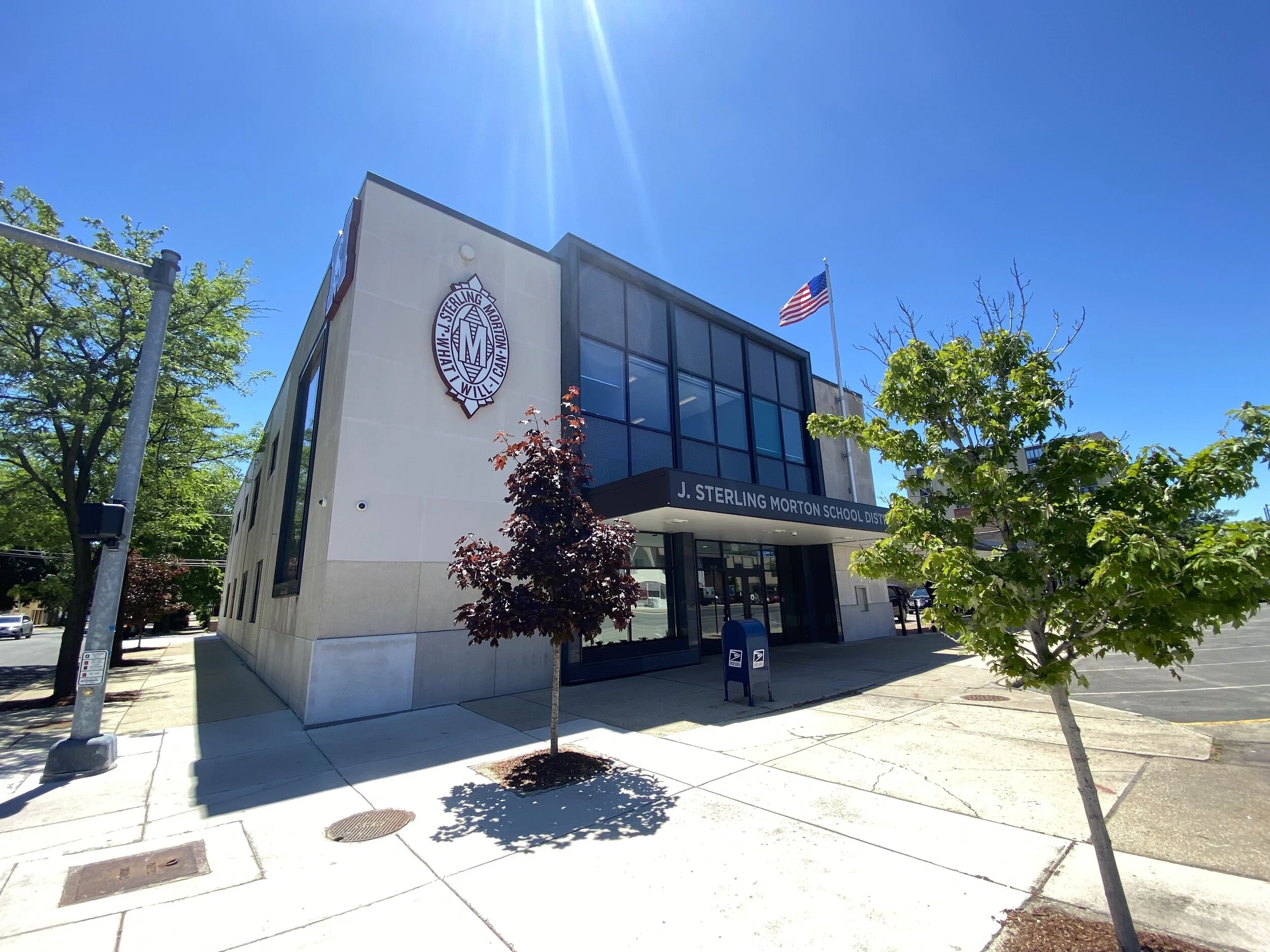District 99 Creates an Alternative School for Middle School Students in Cicero
Exterior of McKinley Elementary School which this school year made the transition to an alternative school. (Photo by April Alonso).
By Michael Izquierdo
Over the summer, District 99 restructured the McKinley Elementary School into the McKinley Educational Center, an alternative school for middle school students.
Cicero Independiente submitted a Freedom of Information Act (FOIA) request and obtained documents that record this transition.
Before the school year began, McKinley school parents received a letter from Superintendent Rodolfo Hernandez announcing “boundary changes” for the upcoming school year due to “the changing nature of demographics” within Cicero.
The letter further mentioned the elementary school would no longer teach kindergarten through second-grade students instead, they would be reassigned to either Burnham, Wilson, or Warren Park elementary schools.
The letter did not mention that the elementary school would operate under an alternative educational program for sixth through eighth-grade students starting in the Fall of 2020.
Alternative schools are usually designed to educate and accommodate students who may need additional support that cannot be addressed in a traditional school environment. These schools commonly enroll students with learning disabilities, medical needs, behavioral or emotional challenges, specific academic interests and those who have been expelled, suspended, or incarcerated.
The Illinois State Board of Education recognizes several types of alternative programs, focusing on “academic, behavioral, and social/emotional intervention” to “attendance problems and/or dropouts.”
"We, as a council, are really happy that we have this opportunity to keep students that we would have normally out-placed. We can now keep them in the district because we have this alternative school, so they can remain District 99 students,” said Marisa Mills, a seventh grade teacher and a Regional Vice President for the Cicero Council. “We're happy that we're pushing for our staff to be fully trained, and have access to extended social work, and other service providers in order to meet the needs of these really special students.”
Cicero Independiente obtained the McKinley Educational Center’s Alternative Education Guide, a four-page document that lists the expectations and features of the alternative education program. According to the guide, the school provides an alternate option for students who “are not benefiting from the traditional school setting” by providing “flexibility, intensive behavioral supports, social and emotional supports, individualized instruction and remediation” for all students enrolled.
The school’s curriculum focuses on incorporating a mix of technology, project-based learning, STEAM projects, and other various methods to instruct students.
The McKinley school, along with every school in the district, has been operating remotely. There are currently 10 students enrolled at McKinley Educational Center, with two students in seventh grade and eight students in eighth grade, according to a spreadsheet obtained by Cicero Independiente.
The alternative school operates on a point and level system designed to manage the attitudes of students who may exhibit “challenging behavior.” Students’ behaviors are monitored throughout the school day, earning a point every 15 minutes for exhibiting “appropriate behavior” in each class period. Students can obtain a maximum of four points in a single class period and a total of 35 points for a school day.
Students must obtain a consistent amount of points for a consecutive amount of days to meet the criteria for different levels and granted access to “rewards and privileges.” There are four different levels students can advance to, each maintaining specific privileges.
According to the guide, students and staff meet and create personalized plans to set goals and address “specific personal/social/emotional and other life skills” needed for individual students. Some ways staff are supposed to meet students’ needs is through restorative practices that restore relationships and rehabilitate harm.
The use of alternative schools, however, has come under fire in the past. According to 2017 investigations from ProPublica, many traditional high schools in the United States use alternative schools and programs as a means to push out students with low test scores, truancy, and risks of dropping out as a way to skirt accountability.
Elena Quintana, executive director for the Institute on Public Safety & Social Justice at Adler university, is familiar with alternative schools through her work with justice involved young people.
Quintana says that many of the children who enter alternative schools often carry a lot of unaddressed trauma from schools, home and their personal lives.
“They [alternative schools] have less expectations. They have less rigorous educational standards, and they often are just kind of a place for young people that have mental health difficulties, that have other kinds of disabilities, or that are really traumatized,” said Quintana. “So, you get this kind of densely populated trauma history in each of these alternative schools that are oftentimes not well equipped to respond in a proactive way to all the trauma that they're seeing."
According to Quintana, it is difficult to adopt a social justice framework at alternative schools because they are often under-resourced or staff aren’t equipped and trained enough to address students with trauma.
However, in the particular case of McKinley, Quintana made it clear that she is not aware of the restorative justice training educators have but is willing to learn more about the school’s practices.
Due to the impacts of COVID-19 and instruction being online, there is no knowledge on how these practices and expectations have been adjusted and are being practiced in a remote setting.
Superintendent Rodolfo Hernandez and Luis Sotelo, the Mckinley principal have not returned requests for comment.
“There has been talk of making McKinley the alternative school for years. So, I think that they had been in preparation for this for quite some time,” said Mills.
Are you a parent or guardian of a student at McKinley? You can reach out to us via email at info@ciceroindependiente.com to let us know how the transition is going.












